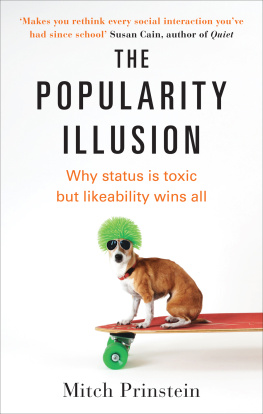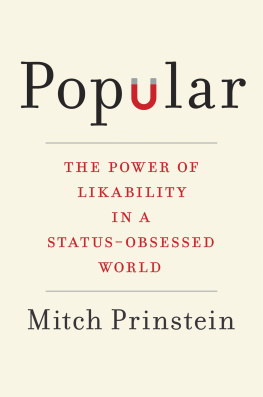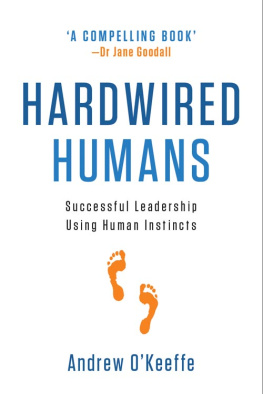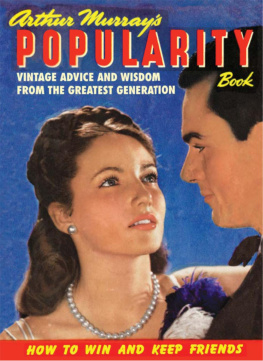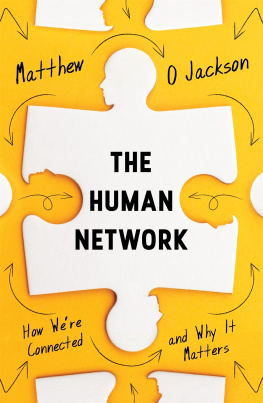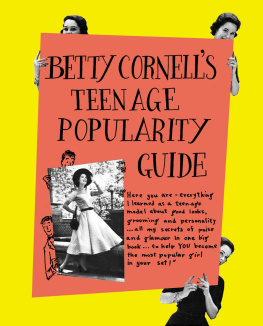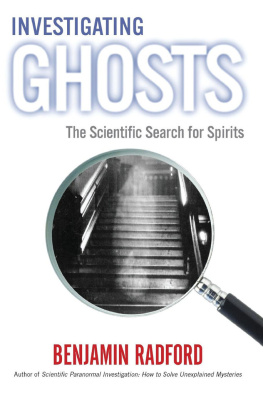CONTENTS
ABOUT THE BOOK
Who doesnt want to be more popular? Surely a persons popularity, be it at school, work or socially, is the best predictor of how happy and successful they will be?
The truth is actually much more complex and is based on millennia of human evolution. This impeccably researched and highly entertaining book presents two very distinct types of popularity and shows how only one of them will get you what you want. Professor of Psychology and popularity expert Mitch Prinstein has based his book Popular on two decades of research into the human psyche and genetic make-up. He investigates the science of what popularity is, why we care about it so much even if we dont think we do and if we can still become popular, even if we were outcasts when we were younger. He investigates social media phenomena, including Facebook friends, Instagram likes and Twitter followers, and explores how they tap into our basic need to survive. He also examines the correlation between popularity, health and lifespan, and offers important insights into parenting for popularity, explaining why supporting children in the right way will help them cultivate the right kind of popularity and shape them positively as adults in the future.
An enlightening read on a topic that has fascinated us for centuries, Popular will provide insight into your own popularity and how it influences your life in unexpected ways.
ABOUT THE AUTHOR
Mitch Prinstein Ph.D. is the John Van Seters Distinguished Professor of Psychology and the Director of Clinical Psychology at the University of North Carolina at Chapel Hill. Mitchs Peer Relations Lab, first at Yale University and then UNC, has conducted research on popularity and peer relations for almost 20 years. His classes on popularity are so popular that people queue down the halls to get in and he has to use the largest lecture halls to hold them. Mitch also serves as the President for the Society for the Science of Clinical Psychology and is a former member of the Board of Directors for the American Psychological Association.
Fascinating, well-researched, and accessible, The Popularity Illusion will make you rethink every social interaction youve had since high school, and help you find greater success and happiness. Read this book, and youll never think about popularity the same way again.
Susan Cain, bestselling author ofQuiet: The Power of Introverts in a World that Cant Stop Talking
Is popularity overrated? Maybe notespecially if its the right kind of popularity that we seek. In Mitch Prinsteins fascinating book, youll learn all about the benefits and pitfalls of being popular and how to make popularity work for you in business and in life.
Daniel H. Pink, bestselling author ofTo Sell Is HumanandDrive
Were you popular as a kid? You no doubt have an answer to that, but Mitch Prinstein wants you to have two: status is one thing, and likability quite another. The origins of both types of popularity are the topic of this singularly fascinating, extraordinarily well-written book. I read it cover to cover and learned as much about the science as I did about myself.
Angela Duckworth, bestselling author ofGrit: The Power of Passion and Perseverance
It turns out that theres more to popularity than status. This book didnt just capture my attention; it also helped me understand why I wasnt cool as a kid, why Im still not today, and why I shouldnt care.
Adam Grant, New York Timesbestselling author ofOriginalsandGive and Take
Who does not want to be more popular? When is that quest not in our best interest? Read Mitch Prinsteins fascinating new book to discover new views on this vitally important topic. The Popularity Illusion offers a brilliant take on a largely misunderstood subject, shedding light on the type of popularity we crave versus the type that will improve our lives. Based on provocative psychological research, it will change how you think about your adolescence, your current relationships today, and ultimately help you become more truly happy in the future.
Phil Zimbardo, bestselling author ofThe Lucifer Effect
Tells us why and also how we can shed the skins of our adolescenceand how our children can achieve meaningful popularity. A science-based Dale Carnegie.
Martin Seligman, author ofFlourish
An intriguing treatise on how popularity works Prinstein observes that the course of ones popularity through life is firmly established way back in first grade. However, he notes repeatedly, there are two kinds of popularity: one is an indicator of status and thus highly variable, while the other is likability an eye-opening look at the ways of the world.
Kirkus Reviews
Prinstein explain that there are two types of popularity: likability and status. By the end, youll realize how your happiness and success have been shaped since early childhood by your perception of and ranking in both types of popularity, and why its not too late to change.
Business Insider
It can still feel like in the adult playgrounds of the workplace, the neighbour-hood party, and of course on social media, there are the popular people everyone flocks around, and the unpopular people being ignored on the sidelines A fascinating new book by a professor of neuroscience and psychology has helped me make sense of all this Mitch Prinstein explains that our early experiences of popularity and unpopularityfrom playground to late adolescencecan have profound effects on our characters as adults and the way we interact with others The good news is we arent all stuckwe can change old patterns by trans-forming our behaviour and attitudes when socialising to become more likable.
Olivia Gordon, Psychologies
The conclusion of The Popularity Illusion is fascinating and hugely comforting for those who were unpopular at school. Yes, popularity has a substantial, even life-changing ability to affect your health and success in life. However there are two types of popularity: likability and status. The key to happiness is likability, not status.
Harry Wallop, Times2
To SAMARA and MAX, and to TINA, the loves of my life.
AUTHORS NOTE
I began working on this book in earnest about two years prior to its completion. But in a very real sense, my research began many years earlier. Perhaps as early as kindergarten. I was always drawn to the study of peer relationships and to psychological science more broadly. I recall my attempt to create an IQ test, using tater tots, on the lunch line in grade school; I posited stage models of adjustment to mid-terms while in eighth grade; and as a teenager, I developed my own taxonomy for different levels of popularity. These examples offer two revelations relevant to this book. First, I was always, without question, a psychology nerd. And second, long before I imagined I would ever write The Popularity Illusion

